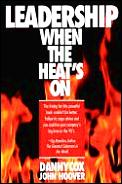 |
TRANSFORMING LEADERSHIP |
| BY DEVELOPING GREAT LEADERS |
| THE PLAN - LEAD - EXCEL LETTER |
| Newsletter Home | Bob's Thoughts | Guest Column | Review | Useful Links | Newsletter Archives | Plan-Lead-Excel Home |
|
PLANNING TO EXCEL: STRATEGIC PLANNING THAT WORKS  Get your copy now and Plan to Excel! Plan for success With all the despair and train your leaders to lead! |

Leadership Lessons Carved in Oil By Bob Mason On April 20, 2010, the oil drilling platform Deepwater Horizon, working in the Gulf of Mexico off the coast of Louisiana exploded, burned, and sank. As might be expected, a gusher of ill considered commentary quickly began to flow with just as much force, creating a torrent of opinion, blame, and advice. One of the elements in this unending stream is a number of people who have rushed in to explain what lessons leaders can learn from the mishap. Some of these commentaries are accurate, but far too many come from a personal bias or believes which are unfettered by facts. When those are removed from the discussion, the actual lessons leaders can take away are more limited and tend to be broader in scope. I will say upfront that I'm not an expert in oil, drilling for oil, or deep water operations, nor do I claim much knowledge of sea water, marine life, or the ecology of coastal areas. Therefore, I will refrain from expressing any opinion on the technical aspects of the case. I do; however, know a thing or two about leadership, especially in a crises and I see some lessons leaders can extract from the mishap and actions taken in response. More will probably follow as cause is determined and litigation begun in earnest and the lessons cited here do not imply that any of the corporate players, or governments involved did or did not apply these principles correctly, merely that they are obvious lessons. 1. When you live on the edge, the ground can suddenly give way. Drilling in deep water is still a fairly new technology and with new technology comes new, and usually increased, risk. The leader's lesson here is that being on the edge may be profitable but it's risky and every effort to mitigate possible problems must be taken. Of course, no matter how many precautions you take, something will go wrong. Murphy is alive and well. 2. What you were before the crises will define how you're seen after the crises. Oil companies have a bad reputation. That reputation is a combination of bad decisions and poor public relations and piling on by people and groups that don't like oil companies. But, few who have interjected themselves in the public discussion seem to be spending much energy evaluating whether the present mishap is related to previous failings, |

The Zen of Leadership There are many aspects to leadership that parallel the philosophies, concepts, and perspectives of Zen Buddhism. I don't profess to have a great depth of knowledge regarding Zen Buddhism, but from the insights I do have, I can see the application with respect to effective leadership. The parallel exists within the concept of leading without leading. It exists in the ebb and flow of leadership style. And it's reflected in the very duality of the role of a leader within an organization. Let me share my perspectives on each of those concepts as an insight into effective leadership. The first concept to expand upon is that of leading without leading. Many people hold the notion that leadership is about leaders and followers. They feel that an effective leader learns how to either "pull" their followers along, or they become adept at "pushing" followers to "follow". At first blush, this might sound a bit simplistic, unrealistic, or na´ve, but the practice of pulling or pushing followers is much more prevalent than one might expect. When we push or pull followers along, they're simply acquiescing to our demands or desires. In contrast, when a leader truly has people following him or her, people act not because they "have to" so much as because they "want to". How is this accomplished? How do we shift our team from acquiescing because they feel they "have to" to a place where they excel because they "want to"? Read this article... | THIS MONTH'S BOOK REVIEW: Leadership When The Heat's On Danny Cox and John Hoover 
One of my most passionate arguments about developing leaders is that there is very little new information and that just because a book is a few years old, doesn't mean it's obsolete. That's not to say there aren't plenty of new books with lots of great information, but, you'd be hard pressed to find much Earth shattering new information. I recently found a book that proves my point. Published in 1992, Leadership When the Heat's On by Danny Cox and John Hoover is a great collection of tips and techniques that are applicable to leaders at all levels. The book has been revised and reprinted several times, most recently in 2007. There seems to be no end to the discussion of the difference between management and leadership. Managers manage things, but they also lead people. It's that leadership skill that will ultimately make them successful. Cox goes to some length to explain how managers lead, but he takes an interesting position on leadership itself. He claims that one can only be a leader when the people he or she leads grants that honor. That's kind of a utopian viewpoint, but the meaning is clear: if a leader wants to be a genuine success, the people he or she leads must voluntarily accept that leadership and follow willingly. Each leader is personally responsible for being in a leadership position as well as their actions as a leader. Read the entire review. |
A QUESTION ON LEADERSHIP You say that integrity is one of your core values. Is integrity really absolute? Isn't there a time when you have to lie a little? I was asked this during a seminar. It's an interesting question that actually comes up often. The supposition is that being tactful requires a little white lie sometimes, like saying "your hair looks great," when it really doesn't. That's missing the whole point though. Leaders must protect their own personal integrity and that means anyone they deal with must be able to trust their words without reservation. Does that mean feelings get hurt? Not necessarily. There's an old saying that tact is the ability to tell someone to go to hell in such a way they will look forward to the trip. A good leader will master the art of expression and be able to tell people what they may not want to hear. But they will always be honest. I admit, I wish I was better at that tact thing so don't ask me about your hair! Please send your comments to comments@planleadexcel.com |
| INTERESTING FACTS | |
| The most populated countries are: China - 1.316 billion; India - 1.18 billion, U.S. - 312 million; Indonesia - 227 million; Brazil - 1.92 million The least populated countries are: Christmas Island - 1402; Niue - 1398; Vatican City - 826; Cocos Keeling Island - 596; Pitcairn Island - 48 Approximately 2 million people quite their jobs in the U.S. between April 2009 and April 2010. Not laid off or fired; just quit. Population data compiled by Wolfram Alpha. Employment data from U.S. Bureau of Labor Statistics |
Follow Me! | |
| RLM PLANNING AND
LEADERSHIP PO Box 50984 Albuquerque, NM 87181-0984 866-243-1682 www.planleadexcel.com email rlm@planleadexcel.com PLAN - LEAD - EXCEL | |